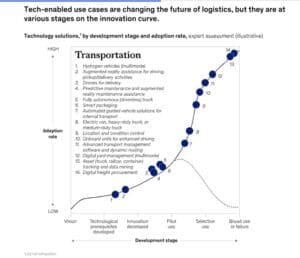
This is the time of year when industry analysts and technology pundits make predictions about the future. McKinsey & Company, a worldwide management consulting firm, has done the same. However, their predictions are based, in part, on a survey of more than 250 global shippers and logistic service providers. The survey covered what technologies they are currently using as well as their planned investments.
McKinsey has recently released a report on shippers’ and LSPs’ investments in transportation, warehousing, and planning technologies. 87% of shippers reported maintaining or growing their technology investments since 2020. 93% said they plan to maintain or increase their spending over the next three years.
In terms of foundational technologies, a surprisingly high 76% of logistics service providers and 64% of shippers have invested in transportation management systems. More advanced solutions include real-time transportation visibility, route optimization, and telematics. 68% of LSPs and 56% of shippers have invested in these more advanced transportation solutions. Even more cutting-edge solutions, solutions that may or may not prove their worth, include delivery drones and hydrogen vehicles. These cutting-edge solutions are at a much earlier stage of development.
In transportation, digital freight procurement and asset tracking & data mining are in broad use. Automated guided vehicles (AGVs) for internal transport, enhanced driving solutions, and digital yard management are starting to scale up. Cutting-edge technologies, such as delivery drones and hydrogen vehicles are at low development and adoption level. The top drivers for these investments are the needs for improved cost, driver, and productivity management.
Implementing new systems is not easy. Most companies mentioned developing a business case, change management, and training as the main challenges they faced when implementing new solutions. Around 80% of LSPs and 68% of shippers cited the cost/ROI analysis as the biggest challenge for transportation transformations.
The technology that could most change the face of transportation is autonomously driven semi-trailer trucks. Understanding when this will roll out, how that roll-out might progress, and what specific autonomous driving model is likely to win in the market, are the biggest questions facing logistics executives. This report did not address these very difficult questions.

















